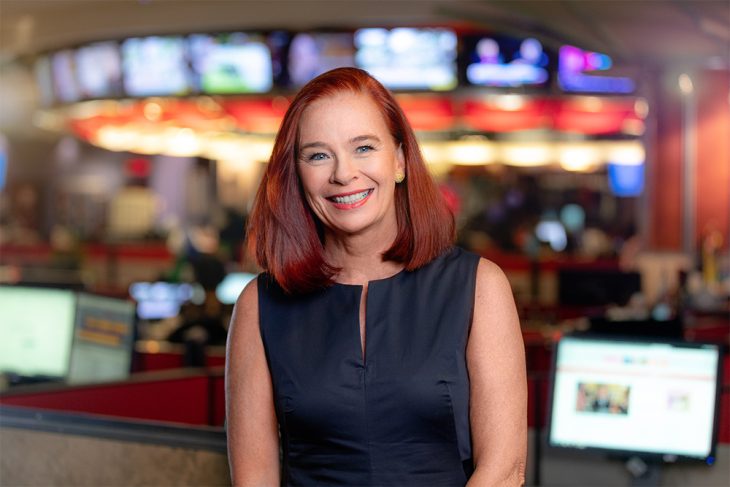
CANNES – Newly-installed CBC/Radio Canada chief Catherine Tait by now has gotten used to people congratulating her on being the first woman to run the public broadcaster.
"But most importantly, I'm the first producer to run the CBC," a fact underlined this week as Tait attends the MIPCOM TV conference in Cannes, where she sat down with Cartt.ca for an interview.
Walking up and down the Croisette and around the bunker-like Palais des Festivals is meant to signal the CBC is open for business as it looks internationally for content and commercial opportunities, Tait said Sunday. She argued the CBC or other Canadian broadcasters facing falling ad revenue in a 500 channel universe, or competition from Netflix and other digital insurgents, can't allow themselves to remain "stuck in your own domestic dilemma."
The way Tait tells it, the CBC is looking to represent “our stories” abroad as it also ensures and sustains audiences back in Canada for homegrown series.
And as a former indie producer experienced in financing complex co-productions and other TV series before heading up the CBC, Tait believes she's well positioned to lead that charge. "For us, when I say we're open for business, it's not just about doing deals, it's about bringing Canada to the world," she added.
Tait argued getting global audiences to binge on Canadian series is important because, not only are progressive Canadian values being projected abroad amid increased political turmoil in the U.S. and elsewhere, but international financing and audiences will better ensure CBC shows get made in the first place, and can also go onto additional seasons.
Before joining CBC-Radio Canada as its leader, Tait co-founded and was president of indie producer Duopoly, and also founded iThentic, where she was executive chair. She also had an executive stint at Salter Street Films and is a founding partner of Hollywood Suite.
The CBC's pivot towards working with international partners follows persistent budget cuts and losing Hockey Night in Canada TV rights, and pre-dates Tait in being a part of the export strategy for Canadian media content pursued in Ottawa by successive Heritage ministers.
But Tait's presence at MIPCOM also signals to indie producers back home the CBC wants as many partners as possible, whether Canadian or international, beyond it's much-vaunted ties to Netflix, with whom it co-produces Alias Grace and Anne, and on which platform series like Kim's Convenience now stream.
She pointed to a CBC kids show, Endlings, a hybrid sci-fi series produced by Sinking Ship Entertainment and airing or streaming on Hulu, the BBC and CBC. "That's a perfect confluence of partners in the sense that everyone benefits, we know the world will see the show, and we're not beholden to a juggernaut like Netflix or Amazon," Tait explained.
Besides more international partners, the CBC under Tait is also pursuing alternative business models as digital media increasingly disrupts traditional broadcast and cable platforms on which the pubcaster has long depended. The CBC has already unveiled Gem, a new streaming service brand offering Canadian movies and kids shows, from the pubcaster and third party producers.
It also launched Panora.TV, a B2B digital platform enabling documentaries to be sold worldwide via a network of like-minded public broadcasters.
"Let's help the producer find the financing. Let's see what we can bring to the table.” – Catherine Tait, CBC
But what about Canadian indie producers that didn't follow the example of Tait and other Canadian filmmakers that went to the U.S. or elsewhere overseas to establish production bases, contacts and co-production partners. Should they be worried by a CBC reaching out to the world possibly at their expense?
Not at all, Tait argues. "If you don't have those relationships, let me share them," Tait insisted.
Canadian producers should see a CBC CEO well-versed in the ways of international markets as an ally, not an adversary, she added. That's especially when Canadian indie producers attempt to put together the patchwork financing required for a Canadian series or co-production inevitably face obstacles to closing a budgetary gap to get to the start of production.
Here Tait sees the CBC having a part to play in putting complex co-productions and other international financing models together, so that the benefits flow back to the independent producers and the public broadcaster.
In the past, Canadian broadcasters often left it to middlemen like Entertainment One and other indie players to structure deals, whether as co-productions or co-ventures. However Tait, with her financial expertise and experience, feels the CBC needs to also be at the table.
"We're saying to Netflix or the BBC, this show is a priority for us. It needs to be supported," she explained.
That said, Tait is adamant she won't be at the table when indie producers pitch their projects to the CBC, as she leaves that to Sally Catto, general manager, programming for CBC English Television. At the same time, she believes indie producers will value someone at the CBC helm who knows their creative and financing challenges in a fast-changing media landscape.
Also not likely to happen at a new-look CBC under Tait is independent producers in a crunch finding the pubcaster able to close any sudden financing gap they face. "Perhaps there was a time when people had deeper pockets and could make the gap. We, in that situation, would have to say ‘let us help you find the more, because we don't have the more’," Tait told Cartt.ca.
The good news, however, is if it's helpful for Tait to use her contacts in the U.S. or elsewhere to find someone able to bring much-needed financing to a series, she's happy to do that. "Let's help the producer find the financing. Let's see what we can bring to the table," she added.
MIPCOM continues in Cannes through Thursday.
Photo by Bonnallie Brodeur.



